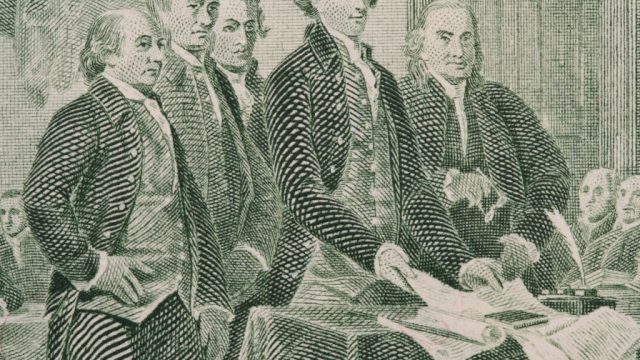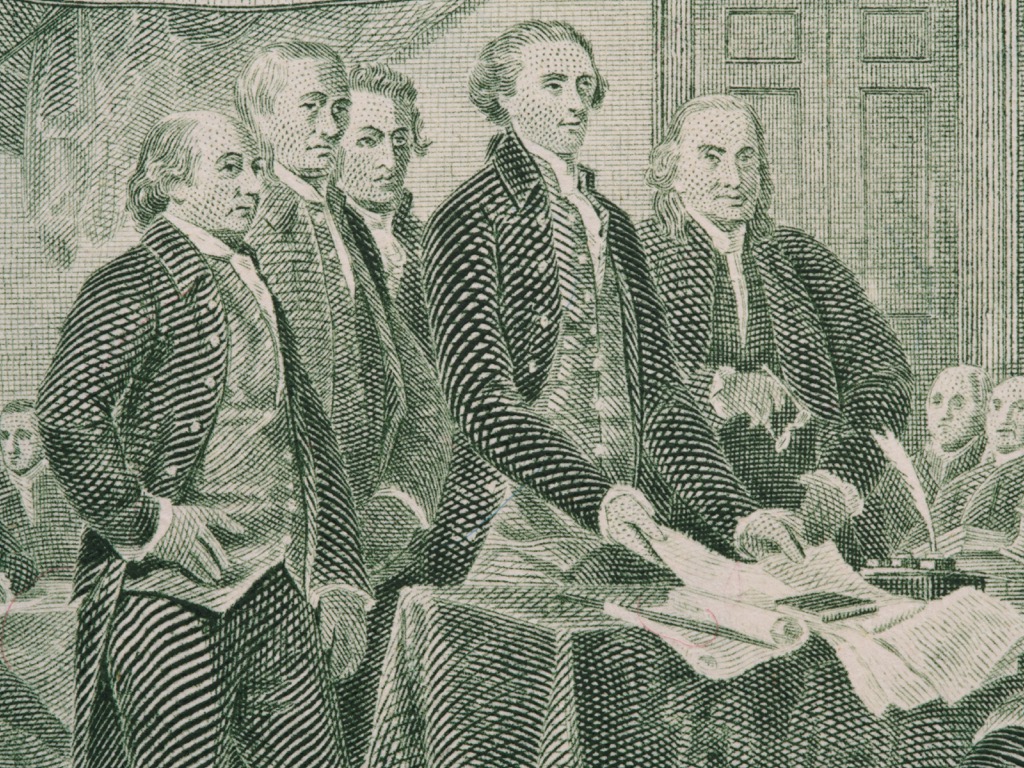17 Crazy Historical Facts That Are Worth Repeating Over and Over

As the saying goes, if you don’t learn about history, then you’re doomed to… Yeah, yeah, yeah. Look: Sometimes history repeats itself. Whether good (a cultural obsession with cats), bad (geopolitical strife), or just plain annoying (insufferable traffic), that’s just the way the timeline works. This is all to say, history isn’t a straight line. It’s a circle. See for yourself!

Ancient Rome was plagued with horrendous traffic that lasted all day and all night. It was so bad that, according to 1st-century Roman scribe Decimus Iunius Iuvenalis, it caused people to literally die, thanks to recurring insomnia due to noise pollution. And you thought the 405 was bad…
To be fair, yes, that Roman writer was one the world’s first satirists, so it’s possible that his whole “people died” claim was a bit of an exaggeration. But the point remains: Traffic always has been—and always will be—a terrible, unavoidable part of urban living.
2
Ancient Egypt Was Obsessed with Cate Memes

The internet is positively teeming with cats. Pictures and videos of the furry felines are constantly going viral online, where they are fawned over on Reddit, Facebook, Instagram, and more. This obsession is nothing new, though. Humans have adored cats for millennia, all the way back to, most notably, ancient Egypt.
Cats were present in cultural and religious iconography, and even regarded as an important member of the household. It’s said that when a cat died, all the members of the household would shave their eyebrows in mourning. Now that’s love.
3
Medical Marijuana Existed in China in 2737 B.C.E.

For nearly all of human history, people have been using cannabis for its healing properties. As long ago as 2737 B.C.E., there are records of cannabis tea being prescribed in China to treat diseases like gout, rheumatism, and malaria. Since then, it has been used medically across the globe, from the Americas, to Asia, to Europe, and Africa, too. However, since it was incriminated in the United States in 1916, many have lost sight of these healing properties. Only recent progress in legislation is beginning to change negative public perception.
4
Rome’s Government Was Shut Down for Years at a Time

Yes, the United States recently went through its longest shutdown in its history, leaving hundreds of thousand of federal employees furloughed. But we’re not the only country—nor the only era—to experience serious shutdowns. In Roman times, there was a similar strategy for resolving conflict: secessio plebis.
Basically, the plebeians would abandon the city en masse, leaving those in power (the patricians) to fend for themselves, essentially forcing both parties to come to the table for discussions. And it was generally a lengthy process. In fact, historians estimate that the first secessio plebis lasted two whole years: from 495 to 493 B.C.E. At the end, the patricians created the Tribune of the Plebs, giving the hoi polloi government representation for the first time in the history of the Republic.
Secession plebis happened four more times over the course of Roman history. The final instance occurred in 287 B.C.E., and culminated in the passage of lex hortensia, a law that granted equal political rights to plebeians and patricians—theoretically, at least.
5
The World’s Average Life Expectancy in 1900 was 31 Years

Fact: People today are living to be older than ever before. We can attribute the elongation of human lifespans to great leaps in science and healthier living practices. To better understand just how far we’ve come, consider the fact that, in 1900, the world average life expectancy was 31. Today, because of the strides humanity has made, the world average life expectancy has more than doubled: to 71.5.
6
This Is What a Fad Diet Looked Like 100 Years Ago

In his 1889 book, Foods for the Fat: A Treatise on Corpulency and a Dietary for its Cure, author Nathaniel Edward Davies comes out swinging against obesity, explaining that “The power of enjoyment is limited in the corpulent person, as exertion is attended with breathlessness, which forbids active exercise…the temperament is proverbially easy-going, indolent, and lethargic, especially after meals, although very frequently interrupted by attacks of peevishness and irritability.”
To avoid becoming such a peevish corpulent person, Davies sets out a pretty clear set of dietary restrictions that “an ordinary-sized person should take.” This consists of:
4.5 ounces of nitrogenous food
3 ounces of fats
14.5 ounces of carbohydrates
1 ounce of salts
For breakfast, he recommends one large cup of tea or coffee, with two to three ounces of bread or dry toast, “very thinly buttered,” and three to four ounces of “any light meat or fish.” For lunch, “an ordinary dish of any soup,” seven or eight ounces of roast or boiled meat, fish, or any meat dish, a “small plate of any non-farinaceous pudding” and five or six ounces of fruit. For dinner: six to eight ounces of light wine; dry toast; boiled eggs, fish, or any meat dish; a glass of whisky and water “with a few gluten biscuits.”
Give or take a few carbs and alcoholic beverages, is that so different from The South Beach Diet?
7
In the 19th Century, Chess Was Considered a Trivial, Brain-Rotting Time Waster

People have become prisoners to their screens, spending more and more time glued to games on their smartphones, tablets, and televisions. With this rise in screen-based entertainment, there’s been an equal rise in an unhealthy sedentary lifestyle. But this is nothing new; people have the same complaints about video games now as they people used to have about chess, which an 1859 edition of Scientific American called an “amusement of very inferior character,” claiming it had no benefit on the body.
8
Laura Ingalls Wilder’s Career Took Off at… Age 65

Young people these days feel an incredible pressure to succeed at a young age, promoting unhealthy habits and damaging self-esteem. It’s worthwhile to remember that success can come at any age, just look at Laura Ingalls Wilder. She was a teacher, a farmhand, and a mother before she ever even considered writing. She was 65 when Little House in the Big Woods was published and 76 when her last book was published. Now, she is remembered for for having written some of America’s most beloved literature.
9
The Founding Fathers Were Vicious Name Callers

Sure, they helped build a nation, but behind closed doors, they were catty as children. On a 1776 trip to Staten Island, Ben Franklin and John Adams stayed overnight at a New Brunswick Inn, where they shared the last room. They hardly got any sleep, though, because they couldn’t stop arguing over whether to keep the window opened or closed. Even the greatest minds fall into feeble traps from time to time.
And long before President Trump came around hurling names like “Cryin Chuck” and “Crooked Hillary,” Vice President Thomas Jefferson and President John Adams had perhaps one of the ugliest presidential battles ever. The war of words culminated in Adams being called a “hideous hermaphroditical character, which has neither the force and firmness of a man, nor the gentleness and sensibility of a woman,” while Jefferson was labeled “a mean-spirited, low-lived fellow” (which was followed it by a series of racial slurs we won’t dare repeat).
10
In 1830, The Average American Drank 7 gallons of Alcohol Per Year

From the cultural preoccupation with craft beer to Instagram’s obsession with rosé, it might seem like Americans are consuming more alcohol than ever before. While alcohol consumption per capita has been slowly growing since 1994, we look like teetotalers compared to the American’s of yore. Back in 1830, the average American consumed 7 gallons of alcohol per year. That’s nearly two 750ml bottles per week! (Today, according to The Washington Post, roughly 80 percent of Americans have 6.25 drinks per week or less per week, and 30 percent don’t drink alcohol at all.)
11
John Adams Cried “Fake News!” in 1798

In 1798, John Adams wrote that there had never been “more new error propagated by the press” than in the decade since freedom of the press had been established in the United States. If only he knew just how much such published errors would drive apart our country centuries later. Though the term “fake news” is a recent invention, its practice is as old as print is itself. We should always remember the power of words.
12
In 1926, a Religious Group Accused Hollywood of Poisoning Young Minds

The dawn of Hollywood was scandalous, especially to religious folk who claimed the movies were a conduit of immorality and sin, warping the minds of young people. A 1926 issue of the Pentecostal Evangelical complained that the beauty, clothing, and low moral standards of the film stars were being unconsciously appropriated by the youth. Glad that got resolved!
13
In Mesoamerica, Soccer brawls Ended in Human Sacrifice

You think Philadelphia is a rough place to watch a live sports game? It’s got nothing on Mesoamerica.
Before millions of people were tuning in, from all over the globe, to watch the World Cup, the game that brought the world the rubber ball was invented in Mesoamerica. The game was played all across the region, and held both religious and ritual significance, bringing forth masses of spectators. The aim was to pass the ball with only the hips, until it made it through a stone hole. However, the post-game antics make brawls between today’s soccer fans look like child’s play, as they often involved ritual human sacrifice. Yikes!
14
Ancient Mesopotamians Used to be Paid in Beer

At least, according to one 5,000-year-old pay stub that was acquired by the British Museum. This ancient receipt shows a record of the amount of beer that one employer paid workers as a wage. This was a common practice during that time, apparently, as there is evidence of a similar system in ancient Egypt. Next time your friends help you move, assure them that six-pack of IPA is totally fair compensation—it’s just history, after all!
15
Pompeii Had a Graffiti Problem

From the ruins of the city, humans have learned that Pompeii was very modern, complete with government, commerce, and, like all modern cities, graffiti. It has been found in all the places you would expect to find graffiti: in brothels, on the walls of inns—in other words, the Pompeiian equivalents to bathroom stalls. As far as what was being scrawled, well, let’s just say that the subject matter hasn’t changed much. (We’ll let you look up the content yourself…)
16
“Blackened Teeth” and “Unibrows” Were Once the Height of Beauty

The way society defines beauty changes over time. While these days, some other things we consider typically beautiful include big lips, thick eyebrows, and an ample bottom, there’s a good chance we’ll look back at these trends in a few decades and wonder what we were thinking. After all, that’s how most people feel about beauty trends of the past. Examples of bizarre trends include pale white powdered skin (!), blackened teeth (!!), unibrows (!!!) made of goat’s hair (!!!!), and even the removal of eyelashes (!!!!!).
We can’t wait to see what the future thinks of the era of social media!
17

Millennials are often thought of as slow-starters, sometimes living with their parents well into their 30s. But the fact is, today’s twenty- and thirty-somethings are setting out on their own far earlier on average than young adults of eras past.
According to Pew, the number of adults living with parents, “peaked around 1940, when about 35 percent of the nation’s 18- to 34-year-olds lived with mom and/or dad (compared with 32 percent in 2014).” Feel free to show this to Mom and Dad next time they bug you about getting an apartment. And for more wacky history, don’t miss The 40 Most Enduring Myths in American History.
To discover more amazing secrets about living your best life, click here to follow us on Instagram!